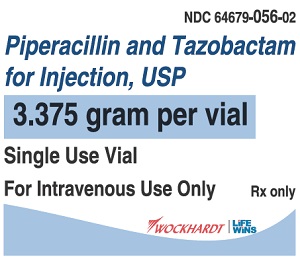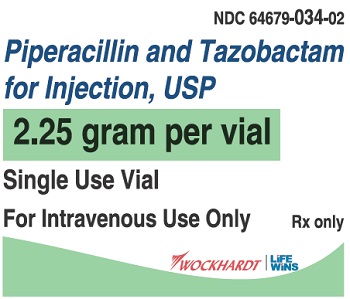For most of the drugs advantages of taking medications overweighs the potential risks however some drugs could be really dangerous for breastfed baby hence every medication shall be considered separately. In this page we will discuss about purpose of Piperacillin And Tazobactam 10 Ml In 1 Vial and its risk associated with lactation. We will also discuss the usage of Piperacillin And Tazobactam 10 Ml In 1 Vial and some common side effects associated with Piperacillin And Tazobactam 10 Ml In 1 Vial.
What is Piperacillin And Tazobactam 10 Ml In 1 Vial used for?
Piperacillin and tazobactam for injection, USP is a combination penicillin-class antibacterial and β-lactamase inhibitor indicated for treatment of: Intra-abdominal infections (1.1) Skin and skin structure infections (1.2) Female pelvic infections (1.3) Community-acquired pneumonia (1.4) Nosocomial pneumonia (1.5) Usage (1.6) To reduce the development of drug-resistant bacteria and maintain the effectiveness of piperacillin and tazobactam for injection and other antibacterial drugs, piperacillin and tazobactam for injection should be used only to treat or prevent infections that are proven or strongly suspected to be caused by bacteria. (1.6) Piperacillin and tazobactam for injection, USP is a combination product consisting of a penicillin-class antibacterial, piperacillin, and a β-lactamase inhibitor, tazobactam, indicated for the treatment of patients with moderate to severe infections caused by susceptible isolates of the designated bacteria in the conditions listed below. 1.1 Intra-abdominal Infections Appendicitis (complicated by rupture or abscess) and peritonitis caused by β-lactamase producing isolates of Escherichia coli or the following members of the Bacteroides fragilis group: B. fragilis, B. ovatus, B. thetaiotaomicron, or B. vulgatus. The individual members of this group were studied in fewer than 10 cases. 1.2 Skin and Skin Structure Infections Uncomplicated and complicated skin and skin structure infections, including cellulitis, cutaneous abscesses and ischemic/diabetic foot infections caused by β-lactamase producing isolates of Staphylococcus aureus. 1.3 Female Pelvic Infections Postpartum endometritis or pelvic inflammatory disease caused by β-lactamase producing isolates of Escherichia coli. 1.4 Community-acquired Pneumonia Community-acquired pneumonia (moderate severity only) caused by β-lactamase producing isolates of Haemophilus influenzae. 1.5 Nosocomial Pneumonia Nosocomial pneumonia (moderate to severe) caused by β-lactamase producing isolates of Staphylococcus aureus and by piperacillin/tazobactam-susceptible Acinetobacter baumannii, Haemophilus influenzae, Klebsiella pneumoniae, and Pseudomonas aeruginosa (Nosocomial pneumonia caused by P. aeruginosa should be treated in combination with an aminoglycoside) [see Dosage and Administration (2) ]. To reduce the development of drug-resistant bacteria and maintain the effectiveness of piperacillin and tazobactam for injection and other antibacterial drugs, piperacillin and tazobactam for injection should be used only to treat infections that are proven or strongly suspected to be caused by bacteria. When culture and susceptibility information are available, they should be considered in selecting or modifying antibacterial therapy. In the absence of such data, local epidemiology and susceptibility patterns may contribute to the empiric selection of therapy. 1.6 Usage To reduce the development of drug-resistant bacteria and maintain the effectiveness of Piperacillin and tazobactam for injection, USP and other antibacterial drugs, Piperacillin and tazobactam for injection, USP should be used only to treat or prevent infections that are proven or strongly suspected to be caused by bacteria. When culture and susceptibility information are available, they should be considered in selecting or modifying antibacterial therapy. In the absence of such data, local epidemiology and susceptibility patterns may contribute to the empiric selection of therapy.
I am currently breastfeeding and I want to know if using Piperacillin And Tazobactam 10 Ml In 1 Vial is safe for my kid? Does it have any effect on milk production?
Piperacillin And Tazobactam 10 Ml In 1 Vial Contains 2 active ingredients that are Piperacillin anhydrous, Tazobactam. We do have breastfeeding analysis and safety rating of some of the active ingredients but unfortunately we do not have any information of some of active ingredients used. Below we have provided whatever information we do have. But please do not take any decision based on below provided information and contact your health care provider as this information is incomplete.
Statement of Manufacturer/Labeler about breastfeeding usage
8.2 Lactation Risk Summary Piperacillin is excreted in human milk; tazobactam concentrations in human milk have not been studied. No information is available on the effects of piperacillin and tazobactam on the breastfed child or on milk production. The developmental and health benefits of breastfeeding should be considered along with the mother's clinical need for piperacillin and tazobactam for injection and any potential adverse effects on the breastfed child from piperacillin and tazobactam for injection or from the underlying maternal condition.
Piperacillin And Tazobactam 10 Ml In 1 Vial Breastfeeding Analsys
SafeCAS Number: 59703-84-3
Ureidopenicillin with a similar use to ticarcillin (see specific info). It is excreted into breastmilk in a clinically insignificant amount (Baier 1982, Chaplin 1982, Wyeth 2007). Because it lacks of oral bioavailability, seems difficult any pass to the infant’s plasma through the breast milk ingested, except on premature infants and immediate neonatal period, in which there may be an increased intestinal permeability. Authorized use in infants and small infants (Chen 2009). Be aware of the likelihood of false negative cultures of febrile infants whose mothers are on antibiotics, as well as the possibility of gastroenteritis due to imbalanced intestinal flora (Ito 1993).
Piperacillin And Tazobactam 10 Ml In 1 Vial Breastfeeding Analsys - 2
CAS Number: 61477-96-1
Limited information indicates that piperacillin produces low levels in milk that are not expected to cause adverse effects in breastfed infants. Occasionally disruption of the infant's gastrointestinal flora, resulting in diarrhea or thrush have been reported with penicillins, but these effects have not been adequately evaluated. Piperacillin is acceptable in nursing mothers.

What should I do if I am breastfeeding mother and I am already exposed to Piperacillin And Tazobactam 10 Ml In 1 Vial?
Not much study has been done on safety of Piperacillin And Tazobactam 10 Ml In 1 Vial in breastfeeding and its ingredients. Even we do not have complete information about usage of Piperacillin And Tazobactam 10 Ml In 1 Vial in breastfeeding so at this point a trained medical professional could be your best bet. If you observe anything abnormal with your baby please contact 911.
My health care provider has asked me to use Piperacillin And Tazobactam 10 Ml In 1 Vial, what to do?
If your doctor considers Piperacillin And Tazobactam 10 Ml In 1 Vial safe enough to prescribe for you that means its benefits should outweigh its known risks for you.
If I am using Piperacillin And Tazobactam 10 Ml In 1 Vial, will my baby need extra monitoring?
We are not Sure, Please check with your healthcare provider or doctor.
Who can I talk to if I have questions about usage of Piperacillin And Tazobactam 10 Ml In 1 Vial in breastfeeding?
US
National Womens Health and Breastfeeding Helpline: 800-994-9662 (TDD 888-220-5446) 9 a.m. and 6 p.m. ET, Monday through Friday
UK
National Breastfeeding Helpline: 0300-100-0212 9.30am to 9.30pm, daily
Association of Breastfeeding Mothers: 0300-330-5453
La Leche League: 0345-120-2918
The Breastfeeding Network supporter line in Bengali and Sylheti: 0300-456-2421
National Childbirth Trust (NCT): 0300-330-0700
Australia
National Breastfeeding Helpline: 1800-686-268 24 hours a day, 7 days a week
Canada
Telehealth Ontario for breastfeeding: 1-866-797-0000 24 hours a day, 7 days a week


